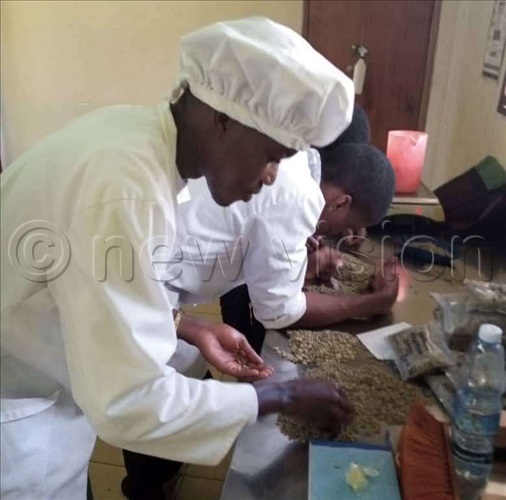
When schools closed due to the COVID-19 pandemic, Innocent Magezi, Caroline Bukirwa Nakato and Reagan Suubi utilized the lockdown to grow their business.
The university students own Nostalgic coffee Uganda, a coffee processing business.
They started it in 2019 with their savings. Each contributed sh100, 000 and they have grown it to sh4million.
They buy coffee beans, sort them, screen and roast them. After, they grind, pack and sell.
They also sell coffee beans.

The team sorting coffee
Magezi, the CEO and head of production is a second-year student pursuing a Bachelor of Education at Kyambogo University.
Nakato heads the finance department and Suubi is the managing director and head of marketing. Both are in their third year at Makerere University pursuing a bachelor’s degree in Agriculture management.
They process their coffee from Makerere University Agricultural Research Institute Kabanyolo (MUARIK) but their main outlet is at Makerere University college of Agriculture and environmental sciences and another at Kyambogo University.
They also have a coffee shop where they sell their products from.
However, this business revolves around Suubi.
He recalls that he wanted to study economics at Makerere University, but he was given Agribusiness management.
Along the way, he interacted with many people in the agriculture sector and developed a passion for agribusiness.
During his first year at campus, he volunteered at an organization that was dealing in agribusiness.
“I got to know a lot about coffee and grew my social network as well,” he shares.
After his first internship, he was determined to start his own business.
“I talked to Nakato and Magezi to join hands and they accepted. I did not have the capital to start on my own,” he says.
Nakato says that they choose coffee processing after discovering a huge consumption of coffee among adults. But they also wanted to encourage the youths to take part.
“We strive to see that our country consumes locally made coffee,” she adds.
The business employs five people; two in their shop and a bodaboda rider who delivers.
They have three packs; 100 grams, 120grams and 250gms. These range from sh15,000 upwards.
Market
Suubi says, they get orders from social media, sell to shops and use platforms such as Omwoleso as well.
“The second lockdown found us prepared. We kept producing,” Suubi says.
Magezi adds that they partnered with Coffee for Talk programme and Tell a story foundation to spread awareness about domestic violence.
They were consequently talking to people about the benefits of taking coffee.
“Many people embraced coffee. This was a great success that helped our sales to grow,” he asserts.
Suubi is quick to add that the lockdown also opened other doors for them.
For example, they have been part of different platforms and exhibitions such as Motiv Africa where they talk more about coffee.
“We mainly focus on inspiring the youth to embrace coffee. They make the biggest population and once they come on board, our sales will definitely shoot up,” he explains.
Suubi adds that they continue to run campaigns intended to give back to the people all while impacting communities.
They are currently running the Keeping the girl child in school campaign.
From all the coffee they sell, they deduct a percentage which they use to buy sanitary pads for girls in Kamuli district.
“We visited Kamuli and saw what the girl child was going through. We committed to helping,” he says.
They are also helping people with disabilities. They collect donations and distribute them among the disabled in different suburbs of Kampala.
Relatedly, the students also help farmers to boost their livelihoods.
They deal in Arabica and Robusta coffee which they source from Timical processors, Kigezi Highland coffee growers and other small scale farmers.
Challenges
Suubi decries stiff competition. Apart from the many coffee entrepreneurs, they also face competition from the tea sector which has many producers.
He adds that balancing books and business is also challenging.
“It is also becoming hard for us to be registered with Uganda National Bureau of Standards (UNBS),” he says.
